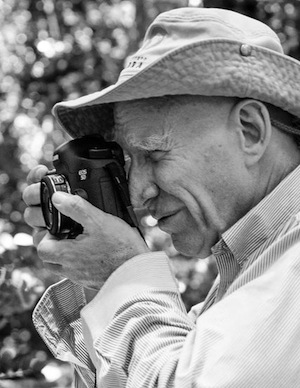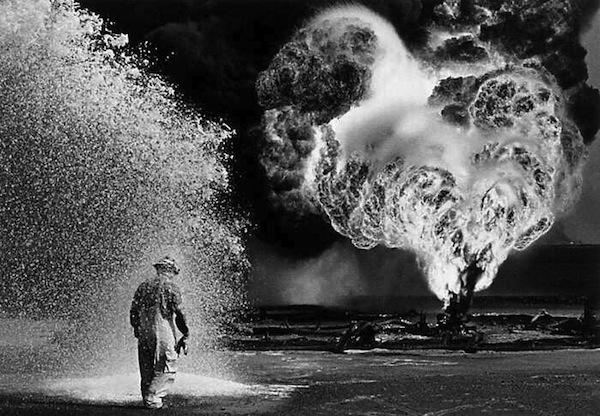Had Wim Wenders not used the title Until the End of the World for his most ambitious road movie, it would have suited his biographical portrait of Sebastião Salgado. Since 1973, the Brazilian photographer has traversed the planet to document its natural beauty and diversity on one hand, and the greed, destructiveness, and murderous ferocity of man on the other.
Thus, another alternative title for The Salt of the Earth, which Wenders was invited to co-direct with Salgado’s son Juliano Ribeiro Salgado, could have been Heaven and Hell, words the photographer uses frequently when being interviewed on camera by the German director. His images of “hell”, which dominate the film’s middle section, linger in the mind long after it has ended on a more hopeful environmental note.
 Not one to flinch from a dangerous journalistic opportunity or the sight of carnage (though he admits to being traumatized by it), Salgado (pictured right) photographed in intimate detail the ravages of the politically inflicted Ethiopia famine of 1983-84, the Bosnian War, the apocalyptic burning of the Kuwaiti oils wells at the end of the Gulf War, and the Rwandan Genocide and its horrific overspill in Zaire. Some of the famine photographs will remind viewers of footage of the Nazi death camps.
Not one to flinch from a dangerous journalistic opportunity or the sight of carnage (though he admits to being traumatized by it), Salgado (pictured right) photographed in intimate detail the ravages of the politically inflicted Ethiopia famine of 1983-84, the Bosnian War, the apocalyptic burning of the Kuwaiti oils wells at the end of the Gulf War, and the Rwandan Genocide and its horrific overspill in Zaire. Some of the famine photographs will remind viewers of footage of the Nazi death camps.
The distinction between them is problematically aesthetic. The US, British, and Soviet army cinematographers who trained their cameras on the camps' survivors and corpses plainly recorded what they saw as factual evidence of war crimes. A master of framing, composition and timing, Salgado is an artist who, through intuition and briliant technique, gives each of his photographs the quality of a poem. His photographs of skeletal Africans who are dying or already dead, of refugee trails strewn with bodies, and of stunned Bosnian families reduced to children and the elderly are all more weirdly beautiful than they have the right to be.
Salgado sounds sincere when he recalls that Rwanda cost him his faith In humanity. “We didn’t deserve to live,” he says. Yet there's a disconnect between his sorrow and his need to lyricise his work. His photographs have drawn attention, through exhibitions and books, to the plight of starving or persecuted Third World people, so they justify his taking them in such a stylized way that they transcend conventional photojournalism.
Because Wenders befriended Salgado, however, he didn't ask him on camera what motivated him to move from one disaster zone to another, what went through his mind when photographing a class room ankle-deep in bones and decayed flesh, or what he felt when his lens made eye-contact with three malnourished babies clinging to life by a thread as they lay beneath a single blanket. (Two would pull through.) Fortunately, Salgado comes across in the interviews with Wenders as an intellectually rigourous and compassionate social observer. (Below: Salgado photo of an Ethiopian refugee with his dog and guitar.)
 The Salt of the Earth is not all Wenders’ work since it incorporates previously shot film of Salgado’s expeditions, for example in Eastern Siberia, where he followed a nomadic band of 18 Nenet tribesman and their remuda of 6,000 reindeer, not only toward the Arctic Circle but also into the ethnographic territory of Robert J Flaherty’s Nanook of the North (1922). Wenders, who gently narrates the film, understandably frontloaded it with Salgado’s account of his adventure amid the estimated 50,000 freelance miners scrabbling for gold in the inferno of Brazil’s Serra Pelada mine, his Breughelian pictures of which are his most iconic and biblically resonant. The documentary is otherwise a roughly chronological life-story, though Juliano's briefly taking over of the narrative with a video selfie a third of the way in disrupts the flow. It’s followed by shots of father and son edging forward on their bellies as they stalk walruses on a deserted Arctic island, the plan to photograph them delayed by an intrusive polar bear.
The Salt of the Earth is not all Wenders’ work since it incorporates previously shot film of Salgado’s expeditions, for example in Eastern Siberia, where he followed a nomadic band of 18 Nenet tribesman and their remuda of 6,000 reindeer, not only toward the Arctic Circle but also into the ethnographic territory of Robert J Flaherty’s Nanook of the North (1922). Wenders, who gently narrates the film, understandably frontloaded it with Salgado’s account of his adventure amid the estimated 50,000 freelance miners scrabbling for gold in the inferno of Brazil’s Serra Pelada mine, his Breughelian pictures of which are his most iconic and biblically resonant. The documentary is otherwise a roughly chronological life-story, though Juliano's briefly taking over of the narrative with a video selfie a third of the way in disrupts the flow. It’s followed by shots of father and son edging forward on their bellies as they stalk walruses on a deserted Arctic island, the plan to photograph them delayed by an intrusive polar bear.
“Sick in soul” after Rwanda – he had “looked into the heart of darkness”, Wenders observes – Salgado returned to the central Brazilian cattle farm where he’d grown up. But his ailing father’s stock had died out long ago as the drought-afflicted area had become a sun-baked wasteland. Salgado's resourceful wife Lélia – who meticulously researches her husband’s photo projects and markets them – suggested they replant the vanished forest, an improbable scheme that proved so successful its ecology (including jaguars) was restored in ten years. The replenishing of Salgado's beloved Instutuo Terra, now a national park, dovetailed with his later career as a nature photographer. Wenders doesn’t miss the opportunity to announce, via a closing title, that “The destruction of nature can be reversed". Human nature, The Salt of the Earth suggests, could also use a rethink.
Overleaf: watch the trailer for Salt of the Earth















Add comment